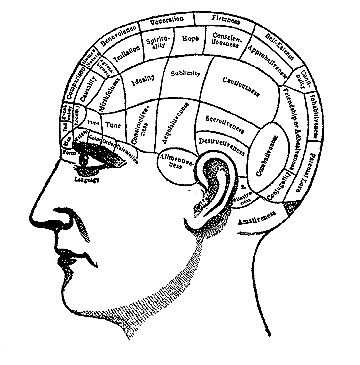
Philosophy of Language and Mind
| Andrew
Mills'
Homepage |
Course
Resources
Homepage |
Dept.
of Religion
and Philosophy |
This is the Homepage for Philosophy 291: Philosophy of Language and Mind. From this page, using the links to the left, you will be able to access all the on-line class materials, including a syllabus, the schedule of readings, study questions, paper topics, as well as copies of any handouts and class assignments. Using the links above, you will be able to access Andrew Mills' Homepage, the Class Resources Homepage (containing links to all the courses Prof. Mills teaches) as well as the Department of Religion and Philosophy Homepage. If you ever get lost, clicking on the image of the phrenology head in the upper-left-hand corner will bring you back to this page.
This is an introduction to the philosophies of language and mind. There is much interplay between these sub-disciplines, and we will see that many questions in the philosophy of language can be resolved only after we have answered questions in the philosophy of mind, but also that questions in the philosophy of mind require having thought through certain issues in the philosophy of language. Among the questions we will consider are these: What is the nature of a human language? How are we able to use language to talk about the world around us? What accounts for the meaningfulness of language? How does communication work? When it comes to the philosophy of mind, we shall think about the following questions: What is the relationship between minds and bodies? Can an adequate account of the mind be given in completely physicalist, or materialist, terms? What is the nature of the emotions? What are the distinctive features of a mind? Is artificial intelligence possible? Do other creatures besides humans have minds? What is the nature of consciousness? The philosophy of language and mind is an exciting and, I daresay, cutting-edge area of contemporary philosophy. Connections will be evident between the subject matter of this class and psychology, cognitive science, computer science, and linguistics.
The primary goal of this course is to gain an appreciation of the ideas and arguments which form the content of the readings. A secondary, but no less important goal, is to develop the critical thinking and writing skills essential to success in any philosophy class. It is my hope that you leave this class a better philosopher yourself, not just someone who knows something about what philosophers say about language and mind. We shall spend a good deal of time interacting with the assigned texts, and doing so serves both goals: it is only by responding to the readings that we will come to understand their positions, and by engaging in a philosophic conversation with them we will hone our critical skills. The reading for this course is, at times, quite difficult, but with the help of the professor and the other students, and with a good deal of effort on your own part, you will come out of this class with a deeper appreciation of metaphysics and epistemology, and, I hope, a better thinker.